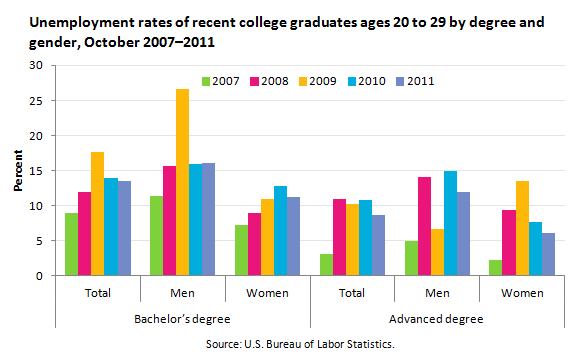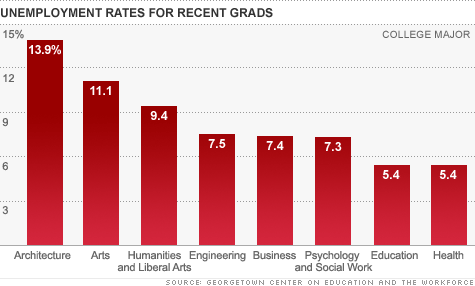Wow! It's been months since I've updated this blog. Dear readers: please ignore any and all advice I give, because apparently I'm terrible at taking it myself. A lot has happened since I last updated this blog. I've been interning at a District Attorney's office for the last 4 months, I'm now engaged and getting married in about 2 months, and I'm graduating in about 1 month. So my life has become pretty hectic in a matter of months.
I'm sure a lot of you readers out there who might be graduating as well are starting to feel the pressure. Don't act like you're not, you know what I'm talking about. That little three letter word that makes college graduates sweat.
Yep, you guessed it: J-O-B.
As tough as it may seem to get a job nowadays, job prospects are not as bleak as they were a few years ago. However, let's be real: the struggle to find a job is pretty daunting, and there are some majors that have high recent graduate unemployment rates. But don't let that discourage you. Let's look at some statistics that might clarify some things about this whole thing.
Ouch. Yeah, okay, so maybe this whole post is a terrible idea. Statistics suck at making people feel better about job prospects. Let's try looking at another one. Maybe this one will have happier data.
Nope, still terrible. So the data might not be in favor of college graduates, but what does all this mean? Let's take a step back an analyze what these graphs tell us.
- Some majors have higher unemployment rates. The graph directly above tells us that some majors have better chances at getting a job. As bleak as that is, it's true, and while the people who are graduating with those degrees will be dismayed soon after graduation, this rate doesn't hold true over time, as you'll see from my next point.
- Having a graduate degree makes a difference. For both men and women, having a graduate degree lowers the unemployment rate significantly. So while you may be unemployed and deep in debt now, the answer is to go even further into debt and get a grad degree.
- The overall rate is going down. Notice the spike in the first graph that happened around 2009. Now notice 2010 and 2011. The rate went down. And it's still going down. The recession of 2008 hit hard in 2009, but we're almost 5 years out from that now, which is an average amount of time that recessions of that magnitude take to recover from. The economy may not be where it was, but it's getting better.
So what now? Go get a job, that's what. Or at least that's what I keep telling myself. Statistics about job prospects may really suck at the moment, but one piece of advice I can impart to those who still have time before they graduate: GET EXPERIENCE. Do an unpaid internship somewhere in your field, and work hard at it. Learn everything you can. Do it as long as you can.
For instance, if you start an internship at say, a small business in your Sophomore year, and stay in that business until you graduate (hopefully) in two years, that's TWO YEARS of experience in that field.
You know how almost every entry-level job asks for two years experience, in addition to the degree? That's no sweat for you now. So get chopping on those internships people. It'll set you apart.
I'll leave you with this: good luck, and may you find the job you're looking for.
-M
















